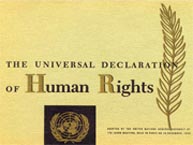Push begins at UN for universal human rights of homosexuals
 New York - A move was launched Thursday at the United Nations to expand universal recognition of human rights to homosexuals, with 63 countries having already signed a declaration to push for the change.
New York - A move was launched Thursday at the United Nations to expand universal recognition of human rights to homosexuals, with 63 countries having already signed a declaration to push for the change.
At a meeting that was not part of official UN proceedings, France, Argentina, Brazil, Croatia, Gabon, the Netherlands and Norway announced the drive to collect more signatures - a move that could eventually bring the declaration into the General Assembly for a vote.
Its backers declared the event historic for bringing the subject of discrimination on the basis of sexual orientation into open debate at the UN.
"For the first time in the history of the United Nations, a large group of members of the General Assembly have spoken out against discrimination of people on the basis of their sexual orientation," Dutch Foreign Minister Maxime Verhagen said.
The UN-AIDS programme supported the declaration, saying it would help people at risk with AIDS or infected with its virus to receive medical assistance.
The UN High Commissioner for Human Rights, Navi Pillay, also gave her support.
"There is now a considerable body of decisions affirming that discrimination on the basis of sexual orientation is contrary to international human rights law," Pillay said.
The measure would apply all rights guaranteed in the 60-year-old Universal Declaration of Human Rights to all people, regardless of sexual orientation and gender identity.
Homosexuality is forbidden and penalized in 77 countries while the death penalty is applied in seven countries: Saudi Arabia, United Arab Emirates, Iran, Mauritania, Nigeria, Sudan and Yemen, backers of the measure noted.
Homosexuality is legal in 47 countries, while 57 other countries have passed legislation to protect same-sex orientation, they noted.
The European Union has endorsed an initiative by France, which has called for the universal decriminalization of homosexuality and a campaign to raise awareness of violence and discrimination against lesbians, gays, bisexuals and transgender individuals.
To underline the importance of the initiative, the Netherlands sent its foreign minister, Vergalen, and France sent a vice foreign minister, Rana Yade, to push for the idea of wider acceptance of the declaration.
The UN last week celebrated the 60th anniversary of the Universal Declaration of Human Rights, which recognizes all basic and fundamental rights of a human beings, ranging from the right to food as well as to freedom of expression.
But the text is devoid of any mention of human rights for same sex people.
After the collection of enough signatures - there is no official minimum, but 100 countries would be considered a significant threshold - the next step would be to send the declaration to the 192-nation UN General Assembly, where programmes of action have to be in the form of a resolution.
The declaration reaffirms the principle of the universality of human rights that "all human beings are born free and equal in dignity and rights."
In the text, signatories condemned human rights violations based on sexual orientation and gender identity wherever they occur, in particular the use of the death penalty, summary or arbitrary executions, the practice of torture, inhuman and degrading treatment, detentions and deprivation of economic, social and cultural rights. (dpa)